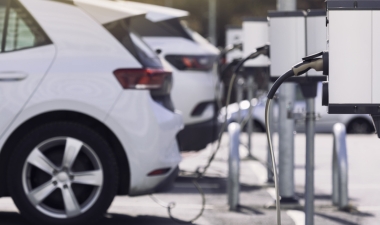- Home
- Beat The Peak
- Beat The Peak With Electric Vehicles
Receive a $100 Billing Credit!
Members who have purchased or who are considering the purchase of an electric vehicle (EV) can play a new and important role in our Beat the Peak program.
By now, most members have probably heard of Delaware Electric Cooperative’s Beat the Peak program. The program asks members to conserve energy during times of peak energy use when the price to produce and purchase power is very high. By voluntarily conserving energy during these peak times, members help to keep rates affordable.
Delaware Electric Cooperative will offer a one-time $100 billing credit and an additional $5 monthly billing credit during the summer for EV owners who limit the use their EV chargers during Beat the Peak alerts. Beat the Peak with your EV by downloading the Optiwatt app on your mobile device. After downloading the app, follow the instructions to set up an account and connect your EV to DEC’s charging program. The Optiwatt app will help you avoid charging during times when the price of energy is high. You should receive your one-time billing credit and monthly credit a few weeks after signing up. Learn more about Optiwatt HERE and sign up for the program HERE. Because Beat the Peak alerts take place during the summer, members who enroll in the program will receive their billing credits in the spring of 2024.
Electric Vehicle QA
Many people talk about the two as though they were interchangeable, but there is actually a major difference: the way they receive power. Electric cars get their energy solely from electric motors. Hybrids work on a combination system, alternating when necessary between electric motors and a gas-powered engine. Hybrids also don’t recharge the same way electric cars do. Even plug-in hybrids have the support of gas power, so if drivers get caught in a pinch, they have that to fall back on.
Electric cars can be charged at home or at a charging station. It’s just like filling up for gas, but instead of a fuel nozzle, you plug in an electric cable. While all-electric charging stations still aren’t as common as gas stations, many are being installed around the country. Look online to find the nearest station near you.
At home, you can run a power cable directly from your home line. Just make sure that your electric service is capable of charging your car, along with what charging equipment is compatible with your car’s system. You will also need to check the specific regulations regarding at-home charging in your city or town.
How long it takes to charge your car’s battery depends on the type of charging equipment it uses. Charging equipment is categorized in three levels: AC Level 1 (standard), AC Level 2, and DC Fast Charge equipment.
AC Level 1 charges come through a 120-volt outlet, which is the general size for home use. Eight hours of charging with this setup gives you a range of roughly 40 miles driving distance.
AC Level 2 requires double the strength, a 240-volt outlet, to charge, but about four times faster than AC Level 1. This can add 20-40 miles to your charge with every hour it is connected.
DC Fast Charge surpasses both of the previous levels. These chargers are available at public charging stations and can provide an 80 percent charge in 20 minutes to an hour.
Generally speaking, the lithium-ion battery in most electric cars is expected to last for about 10 years, but some companies base the battery life on the mileage of the car. For example, one report sited BMW’s batteries were built to last up to 100,000 miles.
This is a real hot button issue with so many people taking an interest in “green living.” Oddly enough, this question is still up for debate. Many people do not see electric cars as environmentally friendly because of the fact that producing the electricity to run them still requires the burning of fossil fuels. Advocates of electric cars counter their claim by saying that, unlike gas-powered engines in conventional cars, power stations can convert fossil fuels into energy much more efficiently.
Find Out More
If you're still interested in purchasing an electric car but aren't quiet convinced, visit https://www.fueleconomy.gov/ to find out more information.
